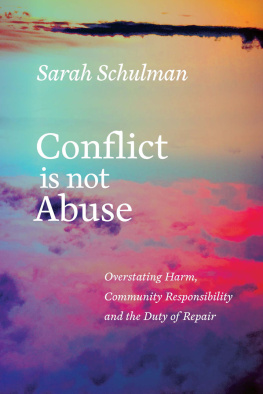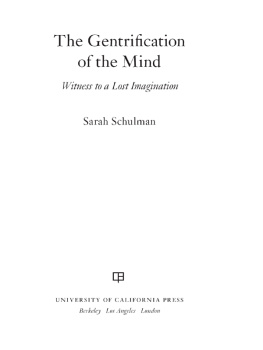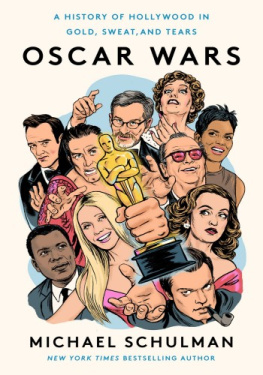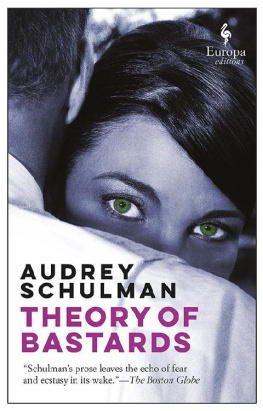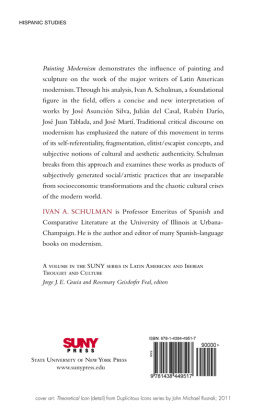

CONFLICT IS NOT ABUSE
Copyright 2016 by Sarah Schulman
All rights reserved. No part of this book may be reproduced in any part by any meansgraphic, electronic, or mechanicalwithout the prior written permission of the publisher, except by a reviewer, who may use brief excerpts in a review, or in the case of photocopying in Canada, a license from Access Copyright.
ARSENAL PULP PRESS
Suite 202 211 East Georgia St.
Vancouver, BC V6A 1Z6
Canada
arsenalpulp.com
Cover and text design by Zab Design & Typography
Edited by Brian Lam
Editorial assistance by Linda Field
LIBRARY AND ARCHIVES CANADA CATALOGUING IN PUBLICATION
Schulman, Sarah, 1958-, author
Conflict is not abuse: overstating harm, community responsibility, and the duty of repair / Sarah Schulman.
Issued in print and electronic formats.
ISBN 978-1-55152-644-7 (eBook)
1. Conflict management. 2. Social conflict. 3. Social psychology. 4. Difference (Psychology). I. Title.
HM1126.S34 2016 303.69
C2016-904334-7 C2016-904335-5
This book is dedicated with love to Hindeleh Pivko,
who was only a little girl.
I am grateful to the men and women who create books, and I forgive the men and women who make books necessary.
VOICE AT QUAKER MEETING, Peterborough New Hampshire
It is not only that we may not choose with whom to cohabitate, but that we must actively preserve the unchosen character of inclusive and plural cohabitation; we not only live with those we never chose and to whom we may feel no social sense of belonging, but we are also obligated to preserve their lives and the plurality of which they form a part. In this sense, concrete political norms and ethical prescriptions emerge from the unchosen character of these modes of cohabitation.
JUDITH BUTLER, Parting Ways: Jewishness and the Critique of Zionism, 2013
Shunning is so often the go-to tool of people dealing with problems or conflict in queer communities, which only contributes to cycles of dehumanization and abuse. Its the easy, simplistic response too often deployed for all manner of interpersonal and inter-community conflict.
COOPER LEE BOMBARDIER, Facebook post, January 2015
I want people to be open to the little power that they do have.
LISA HENDERSON, personal conversation, 2015
CONTENTS
Not everything that is faced can be changed; but nothing can be changed until it is faced.
JAMES BALDWIN
AS I BEGAN THIS BOOK during the summer of 2014, the human community witnessed systemic repetition of unjustified cruelty with exhaustion and frustration. We watched white police officers in Ferguson, Missouri and Staten Island, New York murder two unarmed Black men: Michael Brown and Eric Garner. We watched a rich and powerful professional football player, Ray Rice, beat his wife, Janay, unconscious in an elevator. We watched the Israeli government mass murder over 2,000 Palestinian civilians in Gaza. It quickly became apparent that the methods we have developed collectively, to date, to understand these kinds of actions in order to avoid them, are not adequate.
As a novelist, in order to create characters that have integrity, I apply the principle that people do things for reasons, even if they are not aware of those reasons or even if they cant accept that their actions are motivated instead of neutral and objective. Using this principle to examine those events, I have to ask myself what the white police officers, the wealthy football player, and the militarized nation state think is happening that produces and justifies their brutal actions. As video and witness accounts attest, neither Michael Brown nor Eric Garner did anything that justified the way they were treated by the police. Eric Garner sold loose cigarettes and Michael Brown walked down the street. Both men tried to offer the police alternatives to cruelty. Eric Garner informed the police of the consequences of their actions on him, when he told them eleven times, while in an illegal chokehold, I cant breathe. Michael Brown raised his hands in a sign of surrender and said, Dont shoot. But something occurred within the minds, impulses, and group identities of the white police officers, in that they construed the original non-event compounded with these factual and peacemaking communications as some kind of threat or attack. In other words, these policemen looked at nothing, the complete absence of threat, and there they saw threat gross enough to justify murder. Nothing happened, but these people with power saw abuse.
We know from security camera footage taken in a casino lobby and elevator that Baltimore Ravens running back Ray Rice and his wife were having a quarrel. As much as we dont like quarrels with our partners, and wish they wouldnt happen, disagreement with ones lover is a normative part of human experience. It is impossible to live without it ever taking place. Intimate disagreement is, as they say, life. Yet, Ray Rice experienced normative, regular conflict that exists in every relationship, family, and household in the world as so overwhelmingly unbearable and threatening that he hit his wife, knocking her unconscious, and dragged her limp body by the ankles out of the elevator, leaving her lying inert in a hallway. He looked at normative, everyday conflict, and responded with extreme cruelty. He looked at the regular, even banal, expression of difference and saw threat.
The Israeli government has kept the Palestinian Gaza Strip under siege since 2005. This has made daily life unbearable for its inhabitants. In the late spring of 2014, the government of Benjamin Netanyahu escalated pressure on the already suffering Palestinians, and some factions within Gaza responded with rockets that were of such poor quality they had only symbolic impact. The Israeli government re-reacted in turn to this response with over fifty days of aerial bombing and ground invasion, causing mass death and massive destruction of literal, cultural, and psychological infrastructure. The Gazans were reacting to a state of injustice that the Israelis had created. The Gazans were resisting. They were refusing to go along with unbearable and unjustifiable treatment. The Israelis experienced this resistance to ongoing unfair treatment as attack.
Brown and Garner did absolutely nothing but be Black. Janay Rice expressed normative conflict. Gazans resisted unbearable treatment. In all of these cases the police, the husband, and the nation overstated harm. They took Nothing, Normative Conflict, and Resistance and misrepresented these reasonable stances of difference as Abuse. From the most intimate relationship between two people, to the power of the police, to the crushing reality of occupation, these actors displayed distorted thinking in which justifiable behavior was understood as aggression. In this way they overreacted at a level that produced tragedy, pain, and division. It is this moment of overreaction that I wish to examine in this book. My thesis is that at many levels of human interaction there is the opportunity to conflate discomfort with threat, to mistake internal anxiety for exterior danger, and in turn to escalate rather than resolve. I will show how this dynamic, whether between two individuals, between groups of people, between governments and civilians, or between nations is a fundamental opportunity for either tragedy or peace. Conscious awareness of these political and emotional mechanisms gives us all a chance to face ourselves, to achieve recognition and understanding in order to avoid escalation towards unnecessary pain.
Next page
